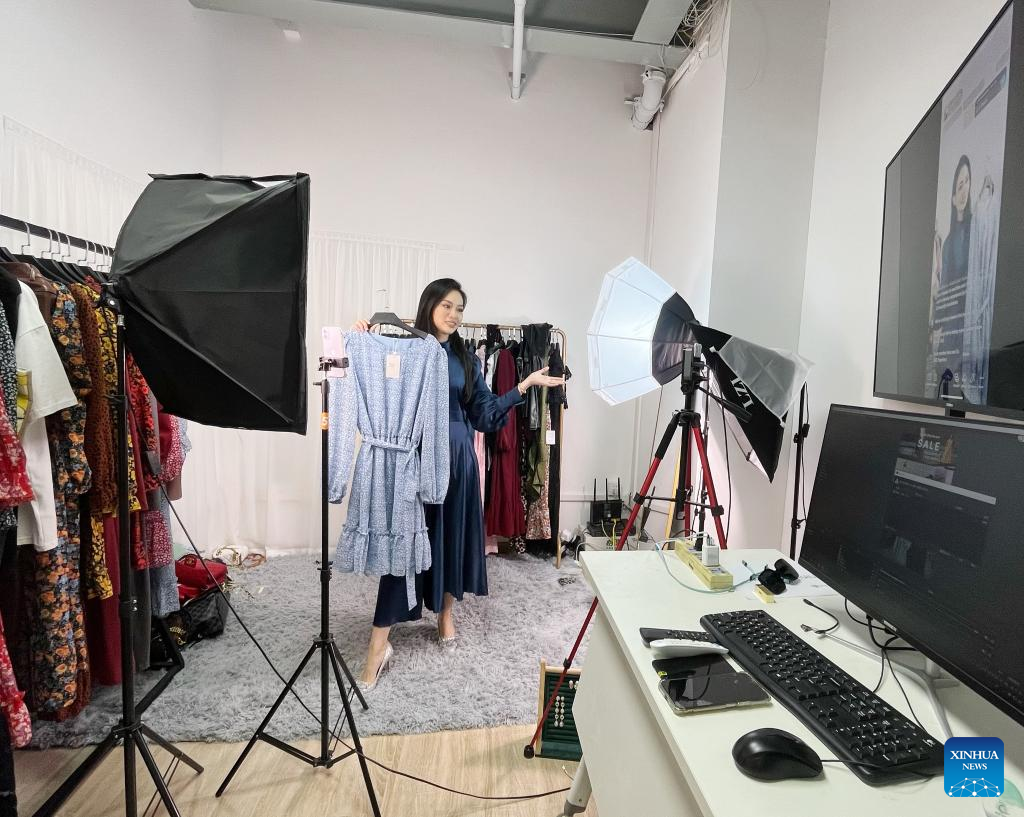
Photo provided by interviewee shows Dora He promoting a skirt via live-streaming in Guangzhou, south China's Guangdong Province, April 27, 2022. (Xinhua)
by Xinhua writers Ye Ting, Ding Le, Huo Siying
GUANGZHOU, May 26 (Xinhua) -- As one of the fast-growing forms of foreign-trade business, cross-border e-commerce has surged popularity in south China's Guangdong Province and has great potential to boost economic recovery amid the COVID-19 pandemic.
The ubiquitous adoption of mobile technology and online shopping among overseas consumers has facilitated the boom in the live-streaming market, providing a valuable platform for the export of various Chinese products and services in innovative ways.
LIVE-STREAMING PROMOTIONS
Every evening from Monday to Saturday, Dora He is busy with her live-streaming promotion activities. In the space of less than five square meters, she models herself and tries on dozens of women's outfits for the overseas consumers to choose from.
Among He's online viewers is Nancy, a housewife in Britain. She purchased a dress through the platform with a simple tap on her phone screen. The dress, worth less than 10 British pounds, arrived at her home in less than two weeks.
At the start of 2021, the video-sharing site TikTok began testing its international e-commerce business in Britain. Many Chinese merchants grabbed the chance and poured into the platform, which allows them to provide instant online shopping services.
"Once, over 300 people attended my broadcasting room simultaneously," said Dora He, noting that she only sells trendy clothing, with a price of about 10 pounds. Her target customers are mainly housewives and students aged between 20 and 35, and she can sell up to 30 dresses a night.
She works for the Yuezitou eCommerce (Guangzhou) Co., Ltd., which provides training courses related to cross-border e-commerce, and also acts as a live-streaming agency for many brands.
The company's director, Zhu Dengling, said the complete and highly developed supply-chain system in China's Pearl River Delta provides e-commerce enterprises with great confidence.
"The local factories can satisfy the need for multiple products very quickly," said Zhu, an experienced entrepreneur who has made forays into various online platforms, including Amazon and TikTok, since 2005.
"In recent years, small enterprises have been able to grab the opportunity to make a fortune," Zhu said, adding that "the live-streaming e-commerce of TikTok is growing phenomenally, benefiting from China's mature supply chain and e-commerce operating systems."
SHORT-VIDEO CREATION
The Ragdoll cat, owned by Puff Media, has gained over 27 million fans on TikTok within two years, thanks to the funny video clips in which it has been dressed up as different characters, such as a cook, scientist and assessor.
Zhang Mingchi, founder of Puff Media, said that part of the secret to attracting the audience was updating the short videos very often with fresh watchable content and various forms of expression.
Zhang positioned his company as an integrated service provider. Besides cross-border e-commerce, the company businesses also cover brand planning and new-media operation.
"An increasing number of Chinese brands plan to enter the overseas market, but they lack visible channels and localized operations," said Zhang.
Most Chinese brands have been embraced in the markets in Europe and America, according to Zhang, while demand is also growing in Southeast Asia. "We hope to help Chinese enterprises reach the different target markets."
The company's services have expanded to clothing, furniture and cosmetics, pet products and musical instruments. With four operation centers in Guangzhou, New York, San Francisco and Milan, it has attracted plenty of international talent in media and marketing.
As TikTok expands e-commerce businesses in more countries, such as Britain, Indonesia and Malaysia, Zhang expects to cooperate with more brands based on the company's hundreds of TikTok accounts to facilitate their entry into overseas markets.
PRECISE MARKET POSITIONING
Hair-clippers, beard-shavers, nose hair-trimmers -- a variety of hair-care appliances from the SUPRENT brand are available on its official website and the e-commerce platform Amazon.
By selling electric trimmers, SUPRENT's overseas turnover exceeded 100 million yuan (about 14.8 million U.S. dollars) in 2020, covering 5 million users in more than 15 countries and regions.
Its parent company 8-Oranges started six years ago and covered a wide range of personal-care appliances, including hair straighteners, hairdryers to hair clippers. Later on, Steve Loo, the company's founder, decided to streamline the product lines and focused on the electric trimmers, which he thought might have greater potential and competitiveness.
With new-media marketing taking the lead, the company seized the opportunity. They interacted positively with online celebrities and hairdressers for evaluations and feedback, and shared the trendy hairstyles and beard styles to enhance brand exposure and public attention.
As an increasing number of people choose to cut their own hair amid the COVID-19 pandemic, Loo is confident that the company's revenue will grow by more than 10 percent this year. It also has plans to establish bricks-and-mortar stores overseas in the future. ■

Dora He prepares for live-streaming in Guangzhou, south China's Guangdong Province, Feb. 28, 2022. (Xinhua/Ding Le)



